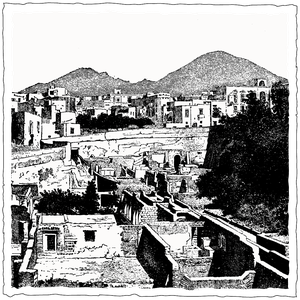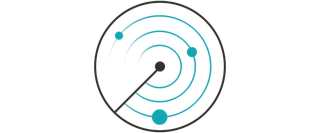Rewriting Vesuvius
The story of Vesuvius
In 79 A.D. a powerful volcano known as Mount Vesuvius erupted, decimating the ancient Roman civilizations that surrounded it. Tens of thousands of people perished, along with the vast riches of their cities.
This event is as ironic as it is tragic. Like any active volcano, Vesuvius had long been warning of an eruption. While Romans used "portents" to predict the future, their understanding of Vesuvius’ activity was woefully misguided, and this mistake resulted in mass destruction for those living in its shadow.
Disaster rarely strikes without warning, and opportunities present themselves to those who know where to look. Understanding threats to your organization through a holistic risk-management plan is known as a horizon scanning strategy. To learn more about where your organization fits into the Rewriting Vesuvius story, explore the personas below.
Dormant
The dormant city of Pompeii was located at the base of Vesuvius and ignorant to the oncoming eruption. Pompeii's need for horizon scanning is high due to its location, but its capability to implement a strategy was low due to its lack of warning of the impending doom.
If your organization was identified as dormant in the horizon scanning assessment, that means your need for horizon scanning is high, but your capability to implement it is low. Having a sufficient horizon scanning strategy gives you confidence that you will not miss emerging risks or opportunities for your business and will be able to react to disruptions in a measured, data-driven manner.





Vulnerable
The vulnerable city of Herculaneum was located on the backside of Vesuvius. Although it was safe from the lava, it was quickly blanketed in deadly ash and toxic fumes. Herculaneum's need for horizon scanning is low as it was spared from the first wave of the eruption, but its inability to respond to the threat resulted in disaster.
If your organization was identified as vulnerable in the horizon scanning assessment, that means your organization may be safe from emerging threats, but a weak information-management strategy prevents you from capitalizing on opportunities or avoiding unprecedented risk. A vulnerable horizon scanning strategy keeps your business from responding to catalysts in a timely and data-driven manner.





Resilient
The resilient, high-ranking commander of a naval fleet known as Pliny the Elder misunderstood Vesuvius's warning signs and was caught off guard by the eruption. Though his hasty rescue mission saved a few thousand lives, an accurate source of information would've spared many more, including his own. Due to his status and duty, both his need for horizon scanning and capability to implement it are high.
If your organization was identified as resilient on the horizon scanning assessment, that means your business is vulnerable to a variety of threats, but you value market intelligence and have incorporated it into your organization. You are ensuring that emerging risks and opportunities are identified early, and your organization is well-equipped to respond.





Vigilant
The vigilant Pliny the Younger, nephew of Pliny the Elder, witnessed the first wave of Vesuvius’ eruption across the Bay of Naples. He quickly assessed the enormous threat and knew he needed to flee immediately. His vigilance allowed him to execute an evacuation plan which saved his life.
If your organization was identified as vigilant on the horizon scanning matrix, that means your business is safe from a number of different threats, but you have still prioritized a seamless consumption of vital information that is valued at all levels of your organization. You are ensuring that emerging risks and opportunities are identified early, and your organization is well-equipped to respond.





Speak to an expert for more information
Get in touch today to gain access to essential features and insight included in FT Group Subscriptions for you and your organization.
Your guide to horizon scanning
The concepts listed below recognize the complex ecosystem that global organizations exist in. It is essential for today’s businesses spot disruptions before they occur as this allows them to adapt, plan, or even lead their industry with a revolutionary response. To learn the bascis of a horizon scanning strategy, review the terms below or contact a representative directly.
In a horizon scanning strategy, "need" refers to the context that an organization exists in. A company’s need for horizon scanning is determined by its proximity to the following factors:
In a horizon scanning strategy, "capability" refers to an organization's ability to identify, interpret and react to disordered change. A company’s capability for horizon scanning is determined by its adherence to—or ability to implement—the following factors:
Fundamentals of horizon scanning
With a horizon scanning strategy, your organization can ensure its longevity by:
- Investing in a reliable source of global information
- Implementing a risk and opportunity identification strategy
- Encouraging internal participation in this strategy across the organization by weaving it into weekly/bi-weekly/quarterly reviews
- Invite staff to share their expertise, and seek external advice concerning knowledge gaps
- Promote a knowledgeable, vigilant organization by allowing staff to access information via the format of their choice through sophisticated technology


Speak to an expert for more information
Get in touch today to gain access to essential features and insight included in FT Group Subscriptions for you and your organization.
Intelligence personalized for your team
The Financial Times brings together subject-matter experts, global reporting, and powerful business tools that give readers a clear, unbiased view of their industry. Rather than relying on misguided advisors or remaining oblivious to tell-tale signs of disaster, the FT can be your trusted guide to sustained success, giving you the information necessary to identify opportunities and sidestep risks.
An FT Group Subscription extracts the intelligence that’s relevant to your business and delivers it via the media and technologies that suit you best, saving you time and keeping you informed on what matters.
Global industries require objective coverage to expose risks sitting outside of a decision-maker’s view. The FT parses through complex stories and raises the alarm when threat is detected. Explore the resources below for a better idea of how the FT can act as a tool for horizon scanning:
Through constant evaluation, the FT predicted the $1.9bn scandal and protected readers who heeded its intelligence
FT premium email briefings unlock key insight on global trade, policy, and more
The FT's premium content equip readers with a broad understanding of their environment. Get a glimpse of our premium content with the articles below:
Unlock a powerful tool for your business
An FT Group Subscription is the exclusive resource your organisation needs to detect risks on the horizon. Benefits include:
- The latest intelligence on the topics that are relevant for your job role with tailored email digests
- Enhanced research which includes charting tools and stock market information to help staff research and analyse companies
- Workflow integration which enables teams to access the FT with their existing workflow or via 60+ news aggregators
- Dedicated support from our Customer Success Team who help you achieve your goals
- Frictionless sharing of FT articles between teams or customers with Enterprise Sharing





Speak to an expert for more information
Get in touch today to gain access to essential features and insight included in FT Group Subscriptions for you and your organization.













